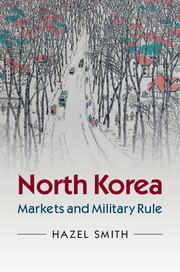Book contents
- Frontmatter
- Dedication
- Contents
- Acknowledgements
- Introduction: North Korea: politics, economy and society
- Part I Jettisoning caricatures: understanding history
- Part II The rise and fall of Kim Il Sungism
- 3 Colonial occupation and the rise of Kim Il Sung
- 4 War-fighting as state-building
- 5 ‘Socialism in our own style'
- 6 Sisyphus as economic model
- 7 Social stratification in the workers' state
- 8 Famine and the end of Kim Il Sungism
- Part III Marketisation and military rule
- Bibliography
- Index
6 - Sisyphus as economic model
from Part II - The rise and fall of Kim Il Sungism
Published online by Cambridge University Press: 05 May 2015
- Frontmatter
- Dedication
- Contents
- Acknowledgements
- Introduction: North Korea: politics, economy and society
- Part I Jettisoning caricatures: understanding history
- Part II The rise and fall of Kim Il Sungism
- 3 Colonial occupation and the rise of Kim Il Sung
- 4 War-fighting as state-building
- 5 ‘Socialism in our own style'
- 6 Sisyphus as economic model
- 7 Social stratification in the workers' state
- 8 Famine and the end of Kim Il Sungism
- Part III Marketisation and military rule
- Bibliography
- Index
Summary
In the early 1960s, policy changed from the rapid reconstruction of the civilian infrastructure that had characterised the immediate post-Korean War period to that of prioritising ‘economic and defence construction simultaneously'. The objective of economic policy was to secure regime survival by building a self-sufficient, modern military capability to act as a deterrent against foreign intervention and to use as an offensive force if required. Self-sufficiency meant minimising external dependence and maximising the use of internal resources. The major internal resource was the physical labour of the population organised by way of the ‘mass line' that was constituted by a top-down command structure and a political system that did not permit opt-outs by individuals. The model was not entirely self-sufficient as it relied on allies and supporters to fill crucial resource gaps, including advanced technology and oil, but it was autarkic in that external players did not have much of an impact on Kim Il Sung's strategy and policies.
Initial results were stunning. The economy grew rapidly and the population benefited from improved social welfare provision. The problem was that the model did not bring self-sustaining growth and it suffered from intrinsic flaws including the skewing of investment to the military sector. Economic strategy never fundamentally changed during the Kim Il Sung years and structural problems were not resolved. The worst of these was the inability to produce sufficient quality and quantity of consumer goods. The most serious weakness was that economic strategy never delivered food security for the population.
Self-reliance: the military imperatives
Economic policy aimed to establish national self-sufficiency in industry and agriculture so the DPRK would not become a dependency of either the Soviet Union or China. The intention was that an indigenous heavy industrial capacity would provide the motor-force of an integrated industrial, agricultural, consumer goods and, most importantly, an armaments and military materièl manufacturing sector.
- Type
- Chapter
- Information
- North KoreaMarkets and Military Rule, pp. 136 - 163Publisher: Cambridge University PressPrint publication year: 2015



